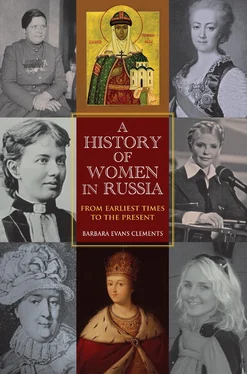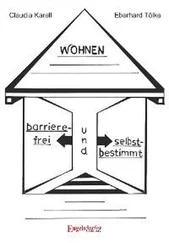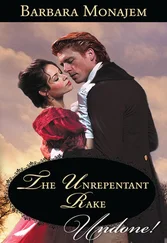Other women came to Vasili’s aid. A female servant named Poltinka, who worked for his sister Anastasia, provided intelligence about the disposition of Shemiaka’s forces, which were occupying Moscow in 1446. His aunt Juliana then traveled to the city on Christmas Eve, requesting entrance so that she could worship there. When the gates were opened, Vasili’s men flooded in and retook the city. In 1449, Shemiaka gave up and went into exile in Novgorod. He died four years later, poisoned, some say, on Sophia’s orders. What is clear is that the relentless politicking of Sophia and the occasional assistance of other female relatives helped Vasili become the pre-eminent grand prince. 20
PROPERTY AND INHERITANCE LAW
As they expanded their land ownership, the elite of the Appanage period also expanded women’s property rights. In Kievan times, women could inherit moveable goods, but probably not land. In the Appanage centuries, parents and husbands began bequeathing land to their female survivors. Most of these inheritances were “life estates” given to widows; a recipient received the income from a parcel of land so long as she lived. On her death, it passed to her male heirs. Such “usufruct rights” were commonly employed across Europe because they provided for widows, while guaranteeing that real property would remain in the widows’ marital families.
Rus law during the Appanage period also allowed women to inherit land free of any encumbrances. Parents could dower their daughters with land, over which the recipients had full property rights. That is, they could sell, mortgage, and will it. Husbands could also leave land to their wives. Thus when Dmitri Donskoi granted huge acreages to Evdokia in his will, he was acting according to notions of women’s property rights that were becoming widely accepted. Anticipating that his sons might claim a voice in their mother’s management of her affairs, he wrote, “And I bless my princess with all these my acquisitions, and in these acquisitions my princess is free: she may give them to one of her sons or she may give them for the memory of her soul [to a monastery]. And my children shall not interfere in this.” 21
The right of elite women to own land in the Appanage period increased their role in property management. Married female landowners probably had to defer to their husbands, for land, even if it formally belonged to the wife, was considered a part of a family’s overall holdings and thus was properly under the patriarch’s control. Widows such as Evdokia, who had been granted both authority and ownership in their husbands’ wills, had full managerial authority over their holdings, authority similar to that exercised by those noblewomen in Western Europe who inherited fiefs.
The best known of such widows, other than the princesses, came from Novgorod, a prosperous city in northwest Rus. There, in the fifteenth century, three women, Oksinia Esipova, Nastasia Grigoreva, and Marfa Boretskaia, were among the city’s largest landholders. One of these women, Boretskaia, led a rebellion against Sophia Vitovtovna’s grandson, Ivan III. 22
MARFA BORETSKAIA (BIRTH AND DEATH DATES UNKNOWN)
Fifteenth-century Novgorod was a thriving commercial hub. Its merchants and nobles imported woolen cloth, salt, beer, metal goods, and gold and silver from the Germanic ports to the west, and silk, cotton, jewels, spices, and steel weapons from the Middle East. Their most valuable export was fur. They also sold wax, honey, tar, and hides obtained from the city’s far-flung hinterland and from trade routes that extended into Siberia. Marfa Boretskaia was born into a boyar family that had grown rich from this trade; she married into another, the Boretskiis. 23Boretskaia worked with her husband, Izak, in managing their lands and marketing their products. She also supervised their employees and ran a large household in Novgorod. Boretskaia did all this without leaving home; it was not considered proper for elite women to travel. When her husband died, she took charge of the business herself. She then expanded it and thereby made her family one of the richest in Novgorod.

“Marfa at the Destruction of the Veche,” as imagined by the late nineteenth-century painter Klavdi Lebedev. http://en.wikipedia.org/wiki/File:LebedevK_UnichN0vgr0dVecha.jpg . Accessed June 27, 2011.
MARFA BORETSKAIA
Lebedev portrayed Boretskaia as a heroic defender of her people against tsarist oppression. The monk who wrote the pro-Muscovy account in the Novgorod Chronicle of the fifteenth century saw her differently.
“AD 1471 The Grand Prince loan [Ivan] Vasilievich marched with a force against Novgorod the Great because of its wrong doing and lapsing into Latinism [Catholicism]….
That tempter the devil entered… into the wily Marfa Boretskaya, widow of Isaac Boretskii, and that accursed [woman] entangled herself in words of guile with the Lithuanian Prince Mikhail. On his persuasion she intended to marry a Lithuanian Boyar, to become Queen, meaning to bring him to Great Novgorod and to rule with him under the suzerainty of the King over the whole of the Novgorod region.
This accursed Marfa beguiled the people, diverting them from the right way to Latinism, for the dark deceits of Latinism blinded her soul’s eyes through the wiles of the cunning devil and the wicked imaginings of the Lithuanian Prince. And being of one mind with her, prompted to evil by the proud devil Satan, Pimin the [Catholic] monk… engaged with her in secret whispering…. This Pimin did similarly trust in the abundance of his riches, giving of them also to the crafty woman Marfa, and ordering many people to give money to her to buy over the people to her will.”
SOURCE: THOMAS RIHA, ED., READINGS IN RUSSIAN CIVILIZATION, 2ND ED., VOL. 1 (CHICAGO: UNIVERSITY OF CHICAGO PRESS, 1969), 44.
Perhaps her commercial success emboldened Boretskaia to become involved in Novgorod’s turbulent politics. This unusually independent city was run by a boyar oligarchy. Some office-holders were elected and an all-male city assembly, the veche, had a voice in city decision-making. The prince, on the other hand, was a hired gun, who served a limited term as commander of Novgorod’s army and was not permitted to live in the city. The boyars were able to maintain this happy arrangement until Ivan III, the grand prince of Moscow, came to power in 1462. Ivan sought to eliminate Novgorod’s special status so as to incorporate the city into his expanding kingdom. Marfa Boretskaia was among those who resisted him.
The conflict burst into warfare in 1471. Novgorod’s elite families were divided: some wanted to make the best deal possible with Ivan, who, they believed, would prevail eventually. Others, Boretskaia among them, argued that the city should call for help from the powerful Lithuanians. She sent her two sons, Dmitri and Fedor, and her grandson Vasili to the city assembly to argue that if the city chose a Lithuanian to be its prince, that man would bring with him an army formidable enough to defend Novgorod from Ivan. Boretskaia herself may have spoken at the meeting, although it was not customary for women to do so. “We are free people of Great Novgorod,” a chronicler records her as shouting, “and the Grand Prince of Muscovy has caused us many offenses and has perpetrated many injustices; but we will be with Kasimir, King of Poland and Grand Prince of Lithuania.” 24
Although the assembly remained divided, Dmitri Boretskii and several other boyars took the field at the head of a Novgorod army. Moscow chronicles record that Ivan III’s mother Maria urged her son to accept the challenge. When the Muscovites won, Dmitri Boretskii was captured and executed, but neither the death of her son nor the failure of the Lithuanians to give the help they had promised weakened Boretskaia’s resolve. Nor did the fact that Ivan made a peace offer that would have preserved some of the city’s liberties. Boretskaia refused to submit even after many other Novgorod families had done so. Her son Fedor fought the grand prince again in 1476, lost, and was taken as a prisoner to Moscow. The next year Boretskaia was driven from her home by a fire that was probably intended either to kill her or to persuade her to submit. Now Ivan was finished with conciliation. He ordered the rebels to leave Novgorod forever. Boretskaia and her grandson were arrested and exiled permanently to Nizhni-Novgorod, a city far to the east of Moscow. Nizhni-Novgorod means “Lower Novgorod.” Perhaps this was Ivan’s idea of a parting shot. Boretskaia died there. 25
Читать дальше













